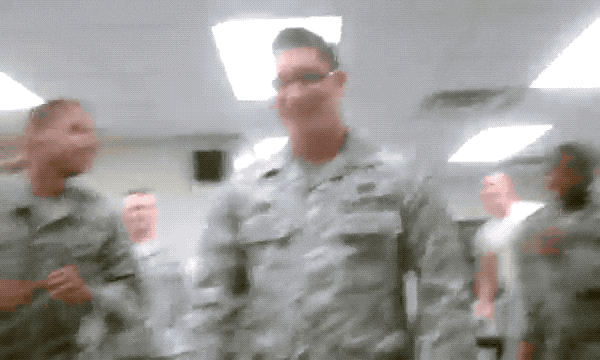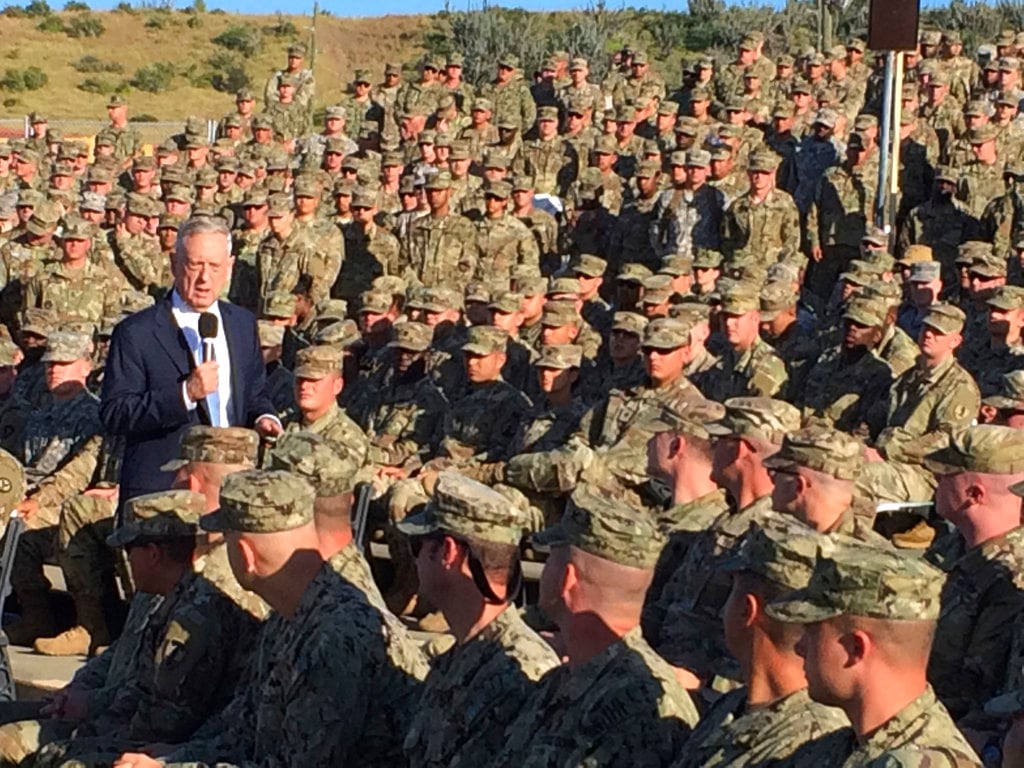A new Defense Department policy banning hazing ― and specifically “tacking” of insignia such as jump wings ― was not meant to bar the traditional light tap of cloth insignia during Air Force promotion ceremonies, according to the service’s Judge Advocate General’s Office.
The policy does, however, bar physically striking other people during congratulatory acts, which would encompass more extreme versions of the tacking-on tradition.
The Pentagon on Feb. 8 released a new policy on Harassment Prevention and Response in the Armed Forces, which includes a section on barred hazing acts, including “Pressing any object into another person’s skin, regardless of whether it pierces the skin, such as ‘pinning’ or ‘tacking on’ of rank insignia, aviator wings, jump wings, diver insignia, badges, medals, or any other object.” The policy said that an action could still be considered hazing even if the victim gave actual or implied consent.
But in a message sent to the field Feb. 28 by the Judge Advocate General’s Office, the Air Force’s lawyers said that “These definitions were not intended to cover the traditional ‘tacking on’ portion of the enlisted promotion ceremony ― where well-wishers tap the cloth rank insignia on the promotees’ sleeves as a congratulatory gesture during the promotion.”

Air Force spokeswoman Capt. Kate Atanasoff said that the service’s judge advocate consulted with DoD’s general counsel to clarify the policy, before sending that guidance out.
The new hazing policy created confusion over what it means for the Air Force’s tradition of tacking insignia. In some cases, an airman being promoted has his friends, family, mentors or supervisors ceremonially tap or press his new stripes with their knuckles for good luck and to make sure the new rank stays on his sleeves.
For example, during the 2015 two-grade promotion of Staff Sgt. Spencer Stone ― who, along with his friends, famously helped stop a terrorist attack on a train to Paris ― the airmen who tacked him on feinted a punch before giving him a playful tap.
In other cases, newly promoted airmen are forcefully punched on the arm, hard enough to bruise or cause the airman to sway. Some videos of tacking ceremonies posted on YouTube show airmen walking between rows of their fellow airmen, taking punches on their upper arms.
Some leaders put a stop to the practice. For example, Col. Mark Weatherington, the former commander of the 28th Bomb Wing at Ellsworth Air Force Base in South Dakota said in a 2013 Q&A with airmen that tacking stripes during wing promotion ceremonies took too much time, and sometimes went too far.
RELATED

“While I appreciate the symbolism of tacking stripes, this practice has at times led to abuse and even injury,” Weatherington said in response to an airman who lamented the loss of the tacking tradition. Tacking could still be done in work centers, the commander said.
The new defensewide hazing policy also bars “any form of initiation or congratulatory act that involves physically striking another person in any manner or threatening to do the same.”
For weeks, it was uncertain whether the less-intense tacking tradition would survive. When asked if taps or slight pushes on stripes that did not cause pain would fall under the new hazing rules, Maj. Carla Gleason, a spokeswoman for the Office of the Secretary of Defense, said in a Feb. 20 email that commanders in the field would make that determination after reviewing facts surrounding incidents or allegations.
The Air Force also said Feb. 20 that the new hazing policy requires Secretary Heather Wilson to provide an implementation plan outlining how the service will comply with the new rules.
Some Air Force units have celebrated tacking and the esprit de corps some feel it builds, and even promoted the practice in public releases. For example, the Air Force’s 407th Air Expeditionary Group published a release in 2005 about tacking during a promotion ceremony in Iraq. In that ceremony, a newly promoted master sergeant’s stripes were tacked on by two Iraqi warrant officers he had bonded with while teaching them to repair aircraft hydraulic systems.
And in an emotional 2014 ceremony, Staff Sgt. Justin Paczesny, a military working dog handler for the 325th Security Forces Squadron, had a retired and dying military working dog named Arco “tack” on his new stripes by biting his protected arm.
Stephen Losey is the air warfare reporter for Defense News. He previously covered leadership and personnel issues at Air Force Times, and the Pentagon, special operations and air warfare at Military.com. He has traveled to the Middle East to cover U.S. Air Force operations.




